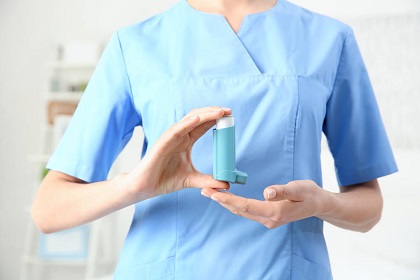Search
This information will help you to:
• Learn about asthma
• Understand the types of medicines used to treat asthma
• Know when to seek medical care
What is asthma?
Asthma is a disease of the bronchioles, the tubes that carry air to the lungs.
When someone has an acute asthma attack, the airways get narrow and may fill with mucus. This makes it hard to breathe. For someone having an asthma attack, it’s like breathing through a narrow straw.
What are the symptoms of asthma?
Symptoms can be different between adults and children. They also vary among individuals. Depending on how fast and how serious the symptoms are, each asthma attack can be very different.
Early symptoms may include:
• Coughing
• Wheezing
• Difficulty speaking
• Chest tightness
• Trouble breathing
• Trouble exercising or playing
How will my doctor treat my asthma?
Inhalers and medicine delivery devices
Most asthma medicines are kept in a small, handheld device called an inhaler. To help the medicine reach the lungs more easily, your child may also use a spacer or a valved holding chamber as an add-on device. Most children can be taught to use inhalers directly or with the right spacer device.
A child who cannot use an inhaler may need to use a nebulizer. This device turns the liquid medication into a mist that can be inhaled through a mouthpiece or mask.
Quick-relief or “rescue” medicines
These medicines are also called bronchodilators. They help to open the bronchioles, making it easier to breathe. Used to treat an acute asthma attack, rescue medicine should be used when asthma symptoms first occur.
The most common rescue medicine used is albuterol (Ventolin).
Long-term controller maintenance medicines
Controller medicines are used daily to keep asthma under control, reducing the severity and frequency of attacks.
Types of controller medicines include:
1. Inhaled corticosteroids
These medicines help to decrease swelling and inflammation, making asthma attacks less frequent. They are usually taken every day, even if your child is not experiencing any symptoms.
Examples include Flixotide and Pulmicort.
2. Long-acting bronchodilators
These help keep the airways from narrowing. They are usually used along with inhaled corticosteroids.
An example includes Seretide.
Oral steroids
Your doctor may recommend steroids taken by mouth (in pill or liquid form) if the asthma is not well controlled. They reduce inflammation and can help the airways become more responsive to inhalers. Steroids usually start to work within about six hours so are not used in acute attacks. Your child should continue to take quick-relief and long-term controller medications while taking oral steroids.
What else do I need to know about asthma?
Follow all instructions you have been given about treating and controlling asthma, including:
• Recognizing and avoiding asthma triggers
• Having an asthma action plan with your health care provider
• Knowing how to use inhalers and related medicine delivery devices
• Knowing how to care for, store, and clean the inhaler mouthpiece, face mask, spacer, and valved holding chamber
• Knowing how to refill prescriptions
When should I seek emergency care?
If your child has any of these warning signs, call 120 or seek emergency medical care immediately.
When your child has been diagnosed with asthma, it is important that he or she is monitored by a healthcare provider. Be sure to take your child to all follow-up healthcare appointments.
Click the link for more information on Family Medicine Clinical Service
Click the link for more information on Pediatric Asthma Clinic Clinical Service
Click the link for more information on Emergency Medicine Clinical Service
Click the link for more information on Respiratory Medicine Clinical Service











